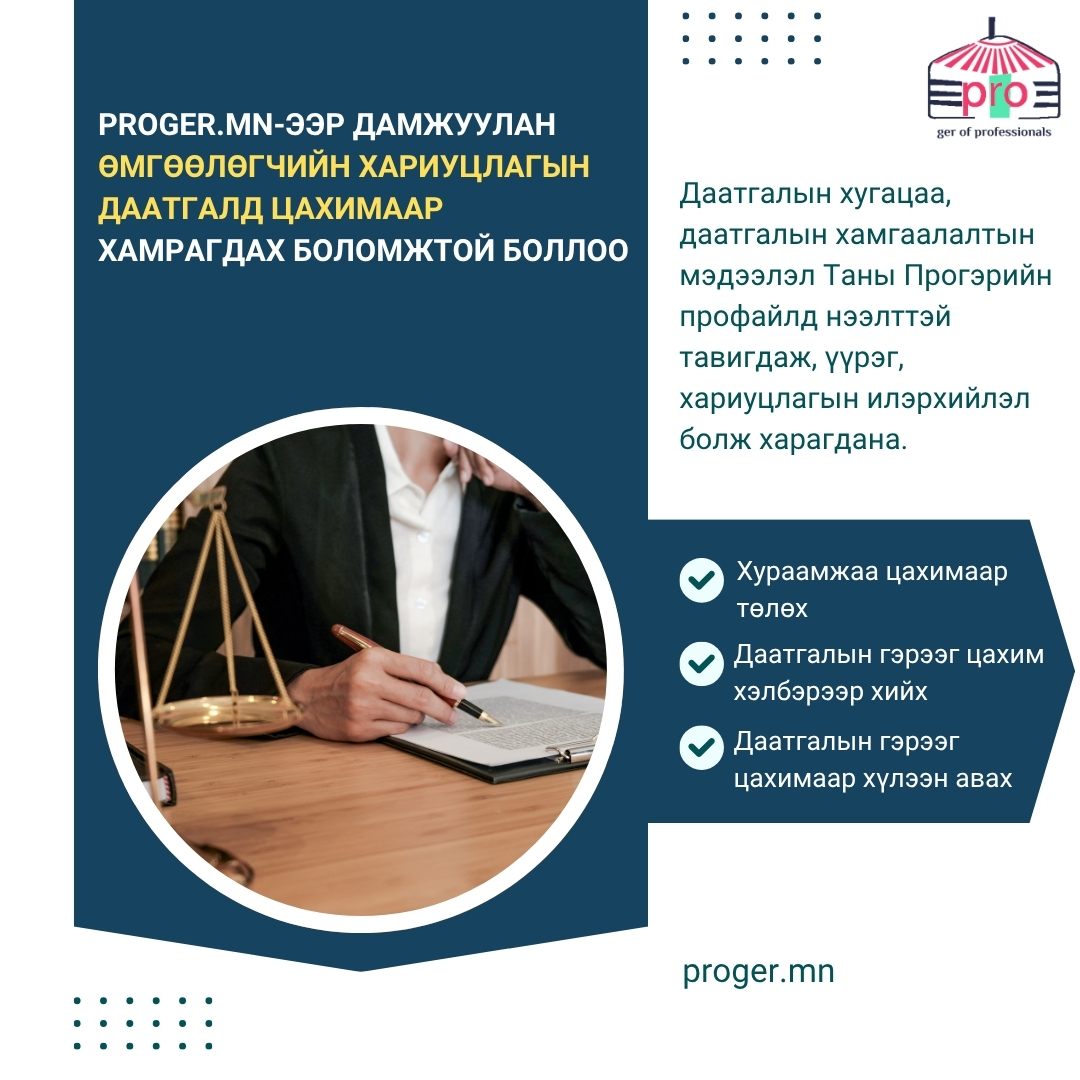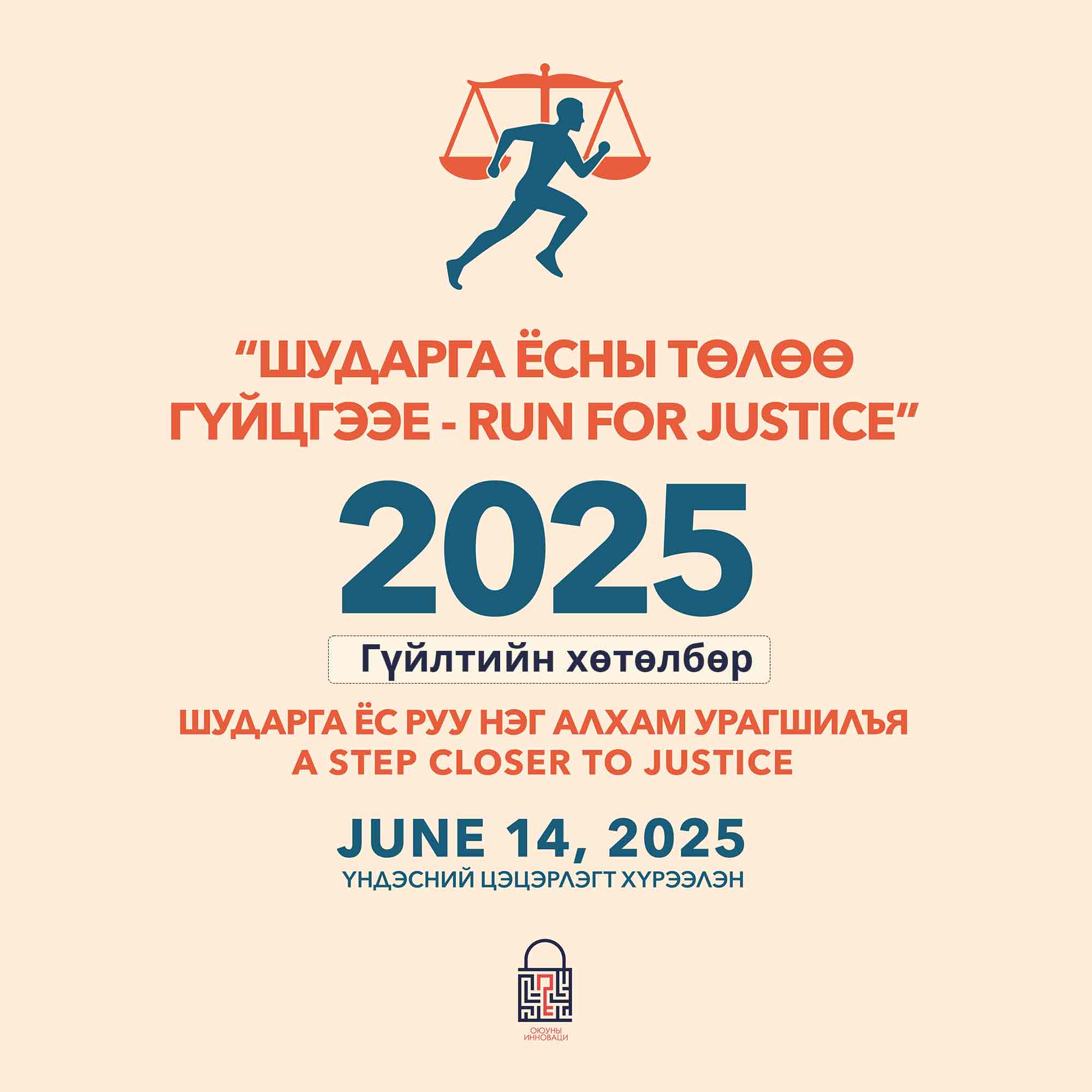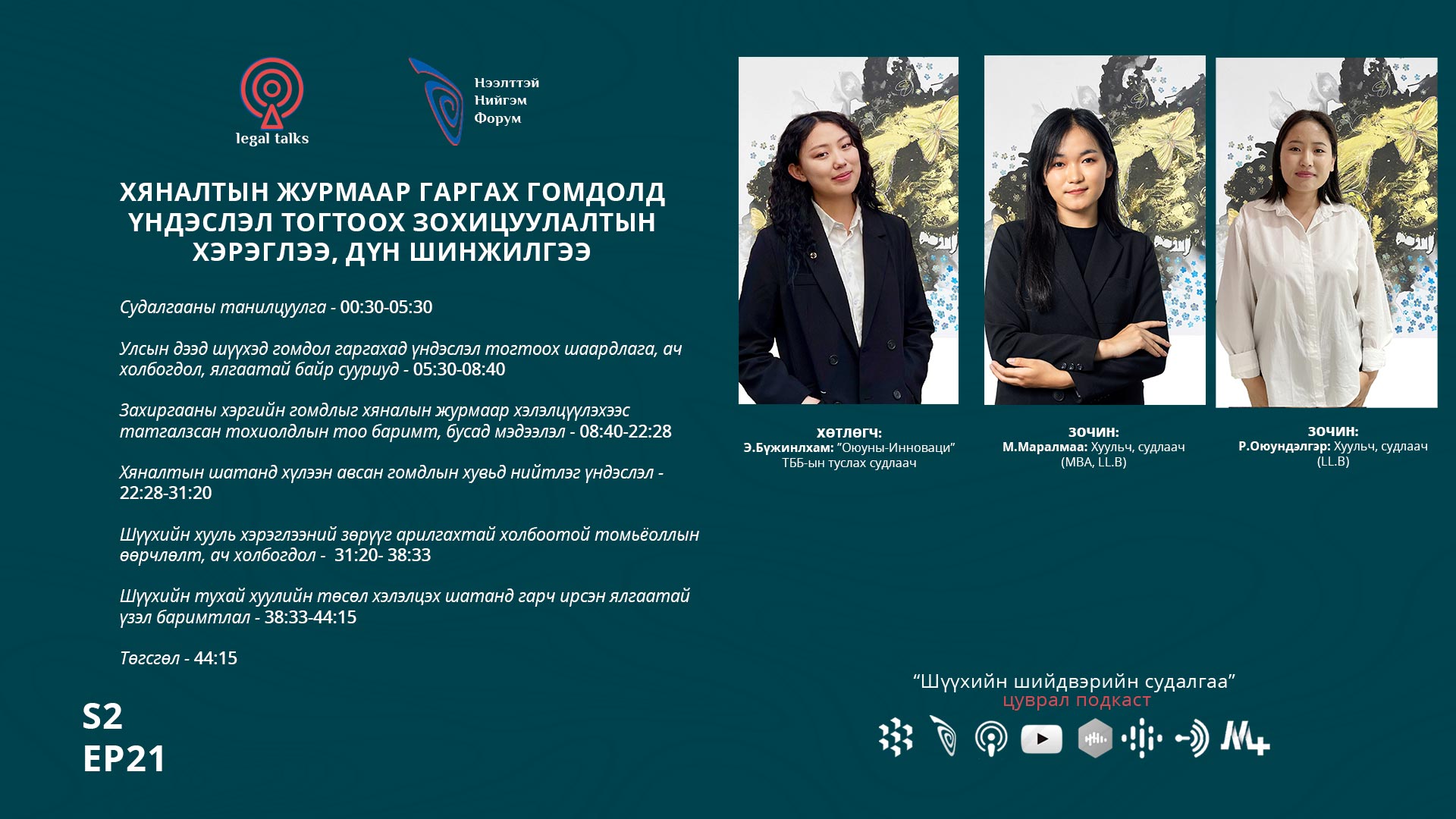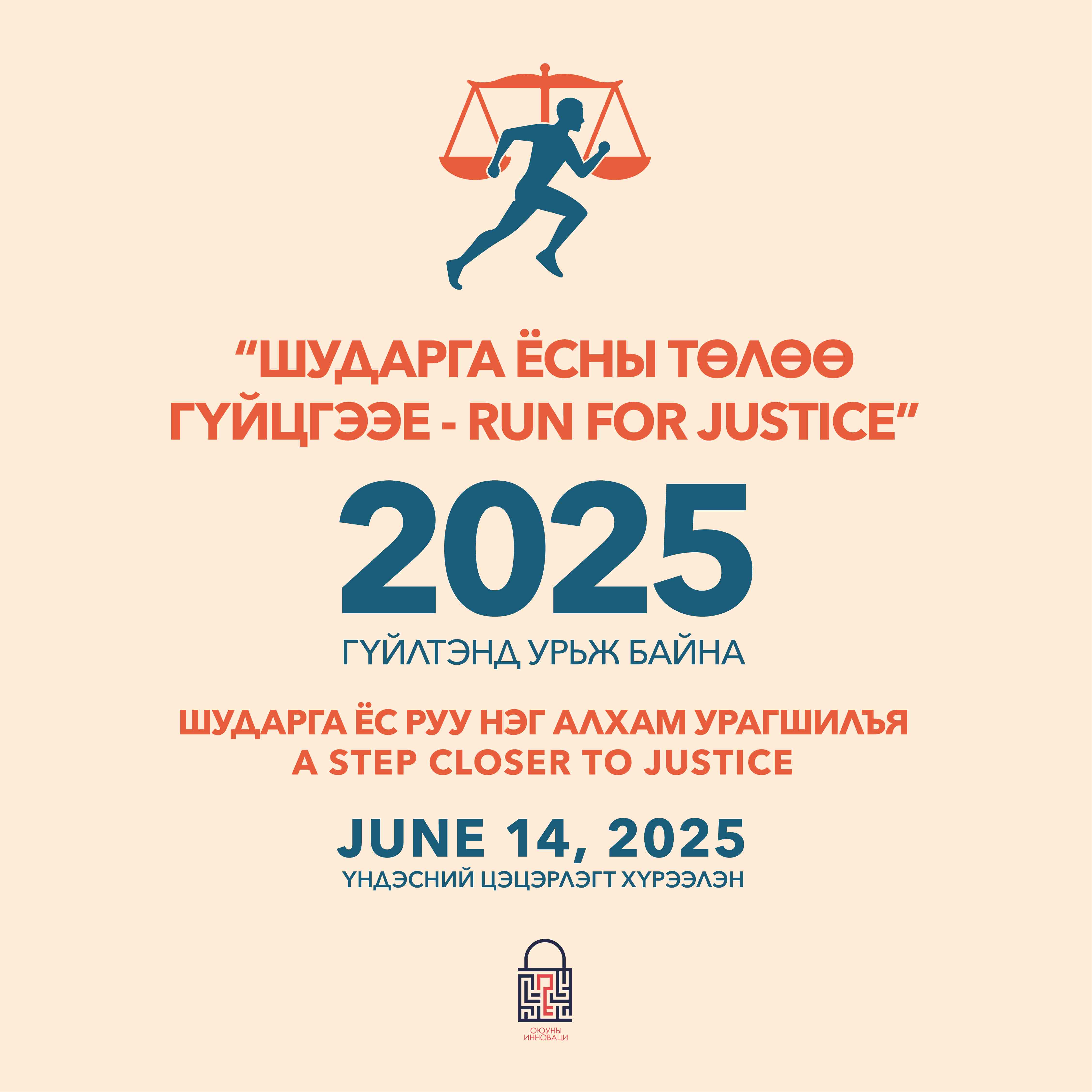Бүртгэлтэй бол нэвтрэх | Бүртгэлгүй бол бүртгүүлэх
[1] M.Batzorig. Transparent court and citizens’ engagement, trends and development. Mongolian Statehood and Law Journal. 2011 №3, p.41.
[1] G.Buyan. Citizens’ participation is a criteria for judicial integrity. https://news.mn/r/672454/ last accessed on 24 January,2025.
[1] https://pressinst.org.mn/ Press Institute of Mongolia
[1] D.Zumberlham. Judicial Reform and Public Trust on Court. Bulletin of International Conference “Strengthening Rule of Law and Improving Public Trust on Courts. (UB., 2023), p.39.
[1] Universal Human Rights Declaration, Article 10. Everyone is entitled in full equality to a fair and public hearing by an independent and impartial tribunal, in the determination of his rights and obligations and of any criminal charge against him.
[1] International Covenant on Civil and Political Rights, Article 146 1. All persons shall be equal before the courts and tribunals. In the determination of any criminal charge against him, or of his rights and obligations in a suit at law, everyone shall be entitled to a fair and public hearing by a competent, independent and impartial tribunal established by law. Article 19. 1. 1. Everyone shall have the right to hold opinions without interference. 2. Everyone shall have the right to freedom of expression; this right shall include freedom to seek, receive and impart information and ideas of all kinds, regardless of frontiers, either orally, in writing or in print, in the form of art, or through any other media of his choice.
[1] For instance, Child Rights Convention (1989), Convention on the Elimination of All Forms of Discrimination against Women (CEDAW) (1979), Comment #32 of the 19th session of UN Human Rights Committee (2007).
[1] Statute of International Court of Justice https://legalinfo.mn/mn/detail?lawId=1216
[1] Rome Statute of International Criminal Court https://legalinfo.mn/mn/detail?lawId=1217
[1] Provision 11, Article 12, Law on Court.
[1] Provision 1, Article 12, Law on Court.
[1] Resolution #276, Judicial General Council,” Regulation for posting open trial recordings on the website”. See following link: https://www.judcouncil.mn/site/decision_full/287.
[1] Resolution #39 of 24 February, 2022, Judicial General Council, “Regulation for posting judicial decisions in the online data portal”; See following link: http://103.11.195.37/san/admin/upload_pdf/b427542950347d0bec9ff3235bb8ad74.pdf
[1] Regulation for organizing online/remote participation in trials https://legalinfo.mn/mn/detail?lawId=16468402228391
[1] Judicial General Council Report 2021- 2023. See the following link for details: https://www.judcouncil.mn/site/news_full/13313
[1] Resolution #39, Judicial General Council, 24 February, 2022, “Regulation for posting judicial decisions in the website”.
[1] Changes in the Status of Democratic Governance 2009- 2010, Project Supporting for Strengthening MDG 9- Human Rights and Democratic Governance, Institute of Philosophy, Sociology and Law, Academy of Sciences, (UB., 2010)
[1] Judiciary and Public Opinion, Judicial Research, Information and Training Institute. (UB., 2015), 19.
[1] East Asian Barometer, 2003, Asian Barometer 2006, Asian Barometer 2010, Political Education Academy.
[1] Report on the Status of Court Reform in Mongolia, Open Society Forum (2009). https://legaldata.mn/b/798
[1] http://www.transparency.org/cpi2014/results
[1] Judicial Research, Information and Training Institute. Mid-Term Evaluation on Court Performance and Judicial Reform. (UB.,2014)
[1] 2024 Index of Economic Freedom. https://www.heritage.org/index/pages/report, last accessed on 22 January, 2025.
[1] Preliminary Impact Assessment on Mongolian Judicial Development Policy (draft). (UB., 2023), p.74. See details in the following link: https://t.ly/OO1fe
[1] In 2021, Mongolian Judges’ Association hired an independent research institution for “Study on citizens’ attitudes towards court and judges”, followed by presenting findings to Judicial general Council. The study was methodologically different from “Study on Public Trust on Courts”, with some similarities, so it was considered as a public evaluation on court services.
[1] Mongolia: Judicial Index 2021 introduced. https://legaldata.mn/news/169 By 2023, Mongolian judicial index improved by 1.28 points https://legaldata.mn/news/392
[1] Soft copy of the report car be accessed from the following link: www.judindex.forum.mn
Mongolian Judicial Index independently evaluates impact of judicial reform in Mongolia, identifies issues that need to be improved subsequently. It does not compare the index with other jurisdictions, but it compares changes between certain time intervals and held every two years. Conducting the first index evaluation in 2021, when the Law on Court was adopted, also aimed at evaluating impact of the law through this index, as the second goal.
Judicial index is an important instrument for (1) realistically evaluate status of court operations through multiple lenses; (2) commit to identify pressing issues, difficulties and challenges to judicial sector based on results of evaluation on each criteria; and (3) identifying future actions and trends grounded on unveiled status and challenges.
[1] Reason for such decline was associated with Government of Mongolia that announced 2023- 2024 as Year for Combating Corruption and started 5Sh operations. In parallel, Government of Mongolia made numerous public announcements through media that Government does not have trust on judicial integrity and independence, and in some cases, Government openly attacked blaming court for impeding its efforts to combat corruption crimes. Whilst, court has no opportunity to provide counter comments in response to Government’s attack and Government made extensive dissemination of its announcements; thus, it could have influenced to such decline, according to research team.
[1] Evaluation given by experts to sub-metrics, public trust on courts, was not incorporated into this part.
[1] In order to watch live broadcasting, users must press on “Live Trials” on upper right left corner of Supreme Court website www.supremecourt.mn to see the access menu on DAN government system. If registered on Dan system, users may enter Civil Registration ID and password and click on enter. If not registered in DAN system, users may use their bank access code or digital signature and watch after entering required information. Also, trails can be watched within 72 hours after the date from “Archive” section of the website. If 72 hours expired, video recording can be watched from “Archive” section after the court decision is formally released.
[1] Mongolian Media Council, Guideline for media ethics and self-coordination. (UB., 2023), p.13.
[1] Mongolia backslid 21 ranks by media freedom index https://eagle.mn/r/126285, https://gogo.mn/r/kx98y last accessed on 31 January, 2025.
[1] L.Galbaatar and et all. Current Situation of Mongolia’s Press Freedom: Introducing International Best Practices. (Research summary). Civic participation project. (UB., 2022), p.76.
[1] Ibid.
[1] Open Society Forum, 20 years, (UB., 2024), p.50.
[1] Bulletin of International Conference “Strengthening Rule of Law and Improving Public Trust on Courts. (UB., 2023), p.7.
[1] J.Bathuyag. Study on public opinion on courts. Mongolian Judges’ Association. (УБ., 2021)
[1] Mongolia: Judicial Index. www.judindex.forum.mn
[1] A.Otgontsetseg. Court and community engagement. Bulletin of International Conference “Strengthening Rule of Law and Improving Public Trust on Courts. (UB., 2023), p.110.
[1] Ibid. p.111.
[1] Ibid.
[1] Guide for journalists launched. https://montsame.mn/mn/read/345847 last accessed on 27 January, 2025.
[1] “Specialized court journalists-11 training held successful”. June 11, 2024, https://www.judcouncil.mn/site/news_full/14240
[1] “Specialized court journalists speak”. accessed January 31, 2025, https://dundgovi- court.mn/old/cat03/11-shhiyn-mergeshsen-setglchid-yarzh-bayna.html. and https://news.mn/r/510551/
[1] Z.Enhbayar, G.Oyunbold, M.Naranchimeg and et all. Guide for Court Journalism. Handbook for journalists. (UB., 2024), p.7.
[1] Ibid.
[1] State Information Gazette: Edition 3, 1997.
[1] National Statistics Office. Number of operating legal entities rose by 6.3% as opposed to last year. https://downloads.1212.mn/ERHJL-FB_DX1Nmqv5_uG2fgP_gVeryiNoR--Z_4T.pdf last accessed on 22 January, 2025. Of all registered legal entities, 181.7 thousand (79.1%) are registered as company, 30.6 thousand (13.3%) as non-government organization, 4.9 thousand (2.1%) as public agency/organizations, 5.3 thousand (2.3%) as partnership and 4.8 thousand (2.1%) as cooperative, respectively.
[1] According to Ministry of Justice and Home Affairs, civil society organizations raise 59.5% of their financing from international donor organizations, 27.9% from individual contributions and 12.6% from their operational income, respectively. Unlike international civil society organizations, national and local CSOs don’t have permanent funding sources; therefore they, in most cases, operate based on competitive project financing opportunities, announced by international organizations. As the project financing remains unstable, civil society organizations had to run different operations/actions than those set as their main activity area.
[1] Asian Development Bank. Civil Society Brief: Mongolia. See details from the following link: https://www.adb.org/sites/default/files/publication/503101/civil-society-brief-mongolia-mn_0.pdf.
[1] N.Tuya, M.Ariunaa, R.Oyunbadam, S.Moiltmaa “Trial monitoring report: /2010.04.05- 2010.06.25/” Open Society Forum. (UB., 2011), p.5. https://legaldata.mn/b/802
[1] M.Munhjargal, B.Turbold and et all. “Handbook for Trial Monitoring” (UB., 2018), https://legaldata.mn/b/451
[1] Trial monitoring report: Monitoring domestic violence trials in Mongolia, 2020. (UB., 2021)
[1] “More than 70 youth attended discussion “Participation of Young Leaders in the Constitutional Amendment” where they acquired knowledge in the importance of the Constitutional Amendment, current situation and discussed what youth can do further jointly. https://www.facebook.com/photo/?fbid=2252184431574972&set=pcb.2250960321697383 last accessed on 31 January, 2025.
[1] Evaluations such as Independence of Court Administration, Independence of Judges’ Appointment, Guarantees for Judges’ Independence and Impartiality, Impact of District Court System.
[1] Open Society Forum implemented “Judicial Decision Project” for 7 years.
[1] https://shuukh.forum.mn
[1] Lawyer P.Bayartsesteg compiled and processed data and Tungaahui Ugugdlyn Urlan LLC worked on data visualization. See the following link for more details: https://shuukh.forum.mn/action
[1] Mongolia must consolidate transformation towards independent justice system. https://mongolia.un.org/en/252740-mongolia-must-consolidate-transformation-toward- independent-justice-system-human-rights-it
МЭДЭЭ, МЭДЭЭЛЭЛ

Өмгөөлөгч мэргэжлийн хариуцлагын даатгалдаа цахимаар хамрагдах боломжтой боллоо
3 days ago

“Шударга ёсны төлөө гүйцгээе – Run for Justice” олон нийтийн гүйлтийн арга хэмжээ болно
3 days ago

S2EP21. М.Маралмаа & Р.Оюундэлгэр: Хяналтын журмаар гаргах гомдолд үндэслэл тогтоох зохицуулалтын хэрэглээ
4 days ago

“Шударга ёсны төлөө гүйцгээе – Run for Justice” олон нийтийн гүйлтэд оролцохыг урьж байна
1 week ago
ШҮҮХИЙН ШИЙДВЭРИЙН ХУРААНГУЙ
-
Бэлэглэлийн гэрээ хэлбэрийн шаардлага хангаагүй нь ажилтандаа орон сууц бэлэглэхээр амлаж, батламж гардуулан, орон сууцыг эзэмшилд нь шилүүлсэн үйл баримтыг үгүйсгэхгүй
2025-06-16
-
Хувь хүний орлогын албан татварын тухай хуулийн 21 дүгээр зүйлийн 21.1 дэх хэсэг Монгол Улсын Үндсэн хуулийн холбогдох заалтыг зөрчөөгүй тухай Үндсэн хуулийн цэцийн 2025 оны 05 дугаар дүгнэлтийн тойм
2025-06-13
-
Ойн модыг үржүүлэн ургуулахаар зөвшөөрөлгүй авах нь гэмт хэрэг болно
2025-06-12
-
Тайванхүүгийн Алтангэрэл, Болор-Эрдэнийн Төрболд
2025-06-16 Судалгааны тайландуудаж байна ! -
Тайванхүүгийн Алтангэрэл, Болор-Эрдэнийн Төрболд
2025-06-16 Судалгааны тайландуудаж байна ! -
Judilogy
2025-06-16 Мэдээллийн хуудасдуудаж байна ! -
Шүүхийн академи
2025-06-10 Судалгааны тайландуудаж байна ! -
Judilogy
2025-06-10 Мэдээллийн хуудасдуудаж байна ! -
Шүүхийн академи
2025-06-09 Судалгааны тайландуудаж байна ! -
Judilogy
2025-06-09 Мэдээллийн хуудасдуудаж байна ! -
Мөнхбатын Хүслэн
2025-06-02 Эрдэм шинжилгээний өгүүлэлдуудаж байна ! -
Мөнхбатын Хүслэн
2025-06-02 Эрдэм шинжилгээний өгүүлэлдуудаж байна ! -
Мөнхбатын Хүслэн
2025-05-30 Эрдэм шинжилгээний өгүүлэлдуудаж байна !